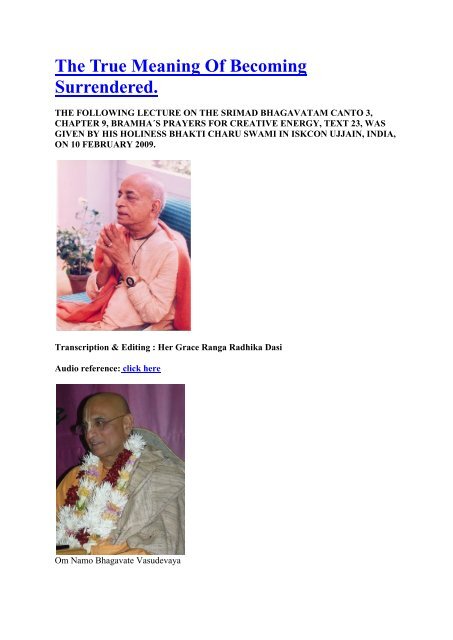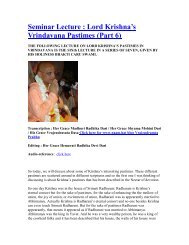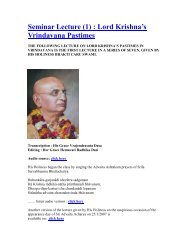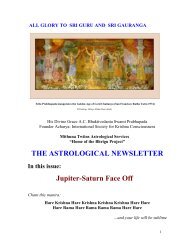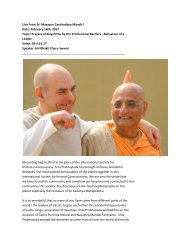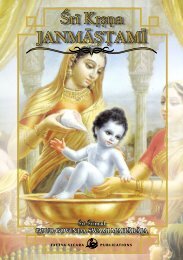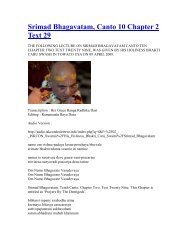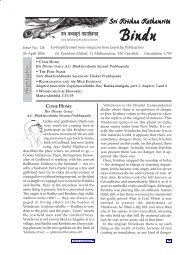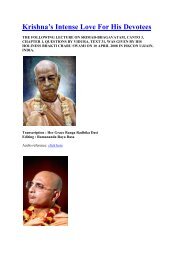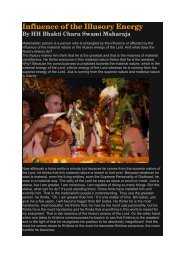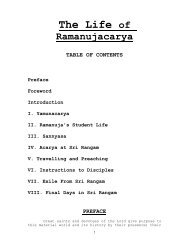The True Meaning Of Becoming Surrendered. - ebooks - ISKCON ...
The True Meaning Of Becoming Surrendered. - ebooks - ISKCON ...
The True Meaning Of Becoming Surrendered. - ebooks - ISKCON ...
Create successful ePaper yourself
Turn your PDF publications into a flip-book with our unique Google optimized e-Paper software.
<strong>The</strong> <strong>True</strong> <strong>Meaning</strong> <strong>Of</strong> <strong>Becoming</strong><br />
<strong>Surrendered</strong>.<br />
THE FOLLOWING LECTURE ON THE SRIMAD BHAGAVATAM CANTO 3,<br />
CHAPTER 9, BRAMHA´S PRAYERS FOR CREATIVE ENERGY, TEXT 23, WAS<br />
GIVEN BY HIS HOLINESS BHAKTI CHARU SWAMI IN <strong>ISKCON</strong> UJJAIN, INDIA,<br />
ON 10 FEBRUARY 2009.<br />
Transcription & Editing : Her Grace Ranga Radhika Dasi<br />
Audio reference: click here<br />
Om Namo Bhagavate Vasudevaya
Om Namo Bhagavate Vasudevaya<br />
Om Namo Bhagavate Vasudevaya<br />
Srimad Bhagavatam, third Canto, ninth chapter “Brahma’s Prayers For Creative Energy’, text<br />
twenty three.<br />
esha prapanna-varado ramayatma-saktya<br />
yad yat karishyati grihita-gunavatarah<br />
tasmin sva-vikramam idam srijato ‘pi ceto<br />
yunjita karma-samalam ca yatha vijahyam<br />
Synonyms:<br />
eshah — this; prapanna — one who is surrendered; vara-dah — benefactor; ramaya —<br />
enjoying always with the goddess of fortune (Lakshmi); atma-saktya — with His internal<br />
potency; yat yat — whatever; karishyati — He may act; grihita — accepting; guna-avatarah<br />
— incarnation of the mode of goodness; tasmin — unto Him; sva-vikramam — with<br />
omnipotency; idam — this cosmic manifestation; srijatah — creating; api — in spite of; cetah<br />
— heart; yunjita — be engaged; karma — work; samalam — material affection; ca — also;<br />
yatha — as much as; vijahyam — I can give up.<br />
Translation:<br />
<strong>The</strong> Supreme Lord, the Personality of Godhead, is always the benefactor of the surrendered<br />
souls. His activities are always enacted through His internal potency, Rama, or the goddess of<br />
fortune. I pray only to engage in His service in the creation of the material world, and I pray<br />
that I not be materially affected by my works, for thus I may be able to give up the false<br />
prestige of being the creator.<br />
Purport:<br />
In the matter of material creation, maintenance and destruction, there are three incarnations of<br />
the material modes of nature — Brahma, Vishnu and Mahesvara. But the Lord’s incarnation<br />
as Vishnu, in His internal potency, is the supreme energy for the total activities. Brahma, who<br />
is only an assistant in the modes of creation, wanted to remain in his actual position as an<br />
instrument of the Lord instead of becoming puffed up by the false prestige of thinking<br />
himself the creator. That is the way of becoming dear to the Supreme Lord and receiving His<br />
benediction. Foolish men want to take credit for all creations made by them, but intelligent<br />
persons know very well that not a blade of grass can move without the will of the Lord; thus<br />
all the credit for wonderful creations must go to Him. By spiritual consciousness only can one<br />
be free from the contamination of material affection and receive the benedictions offered by<br />
the Lord.<br />
[End of Purport]<br />
esha prapanna-varado ramayatma-saktya<br />
yad yat karishyati grihita-gunavatarah<br />
tasmin sva-vikramam idam srijato ‘pi ceto<br />
yunjita karma-samalam ca yatha vijahyam<br />
<strong>The</strong> Supreme Lord, the Personality of Godhead, is always the benefactor of the surrendered<br />
souls. His activities are always enacted through His internal potency, Rama, or the goddess of<br />
fortune. I pray only to engage in His service in the creation of the material world, and I pray<br />
that I not be materially affected by my works, for thus I may be able to give up the false<br />
prestige of being the creator.
So Brahma’s prayers are continuing. So now Brahma is describing that how the Supreme<br />
Personality of Godhead is the Supreme Creator and others, including himself, are the<br />
secondary creator. <strong>The</strong> Supreme Personality of Godhead is situated in the mode of goodness<br />
and, although the material nature’s creation takes place through the agency of Brahma, but<br />
He is the original creator and He is the maintainer. And we can see the proprietor maintains.<br />
<strong>The</strong> creator creates but he is not the real proprietor. So Brahma’s situation is like that.<br />
Brahma’s situation is like that: he is the creator, he is creating. In the material nature he is<br />
creating through the mode of passion. In the material nature creation always takes place in the<br />
mode of passion or through the mode of passion, by the mode of passion. Any creation means<br />
action, activity. Those activities take place in the mode of passion – a lot of energy, a lot of<br />
arrangement, a lot or organization.<br />
So these are the effects or the activities in the mode of passion, whereas the Supreme<br />
Personality of Godhead doesn’t create through the mode of passion. He doesn’t become<br />
active Himself in the material nature in the creation. How does He create? He simply glances<br />
towards the material nature and the creation begins. That is His way of creating, the spiritual<br />
mode, the transcendental mode of creation. He simply glances and as a result of that glance<br />
everything becomes manifest, but when we try to do something in the material nature, if we<br />
want to create a house, can we just glance and the house appears? [laughs] No, we have to<br />
make all kinds of arrangements. We have to first make the design, we have to get the<br />
contractor, we have to buy the materials and then get the workers, then finally. Now how do<br />
these actions take place? <strong>The</strong>se actions take place in the mode of passion.<br />
So Brahma’s role is like that. Brahma is active in the creation of this material nature. That’s<br />
his business. <strong>The</strong> Lord manifested but Brahma was created or Brahma was assigned. Brahma<br />
was assigned to execute the responsibility of creation, whereas the Lord is in the mode of<br />
goodness. And what does He do? In the mode of goodness He is maintaining. Maintenance<br />
takes place in the mode of goodness. It takes a lot of effort to create, but to maintain, then it<br />
means mode of goodness. And that is the role of the Supreme Personality of Godhead.<br />
Now Brahma is reminding, or Brahma is, he is simply a subordinate personality. He is<br />
subordinate to Him, and in the purport Prabhupada is explaining that that is the way a devotee<br />
should always think, an intelligent person should always think. He should not claim his<br />
proprietorship nor should he consider himself to be the enjoyer. Rather, one should try to<br />
recognize that the Lord is the Supreme Proprietor and He is the Supreme Enjoyer. <strong>The</strong><br />
universe has been created for whose pleasure? Brahma is addressing, it is for the sake of the<br />
Lord’s pleasure. And His pleasure is not ordinary, mundane pleasure. His pleasure is<br />
transcendental pleasure and that pleasure is enjoyed by the Lord through His internal potency,<br />
atma-saktya, by His internal potency. And Prabhupada is explaining that that internal potency<br />
is Rama or Lakshmidevi, or Srimati Radharani. <strong>The</strong> Lord doesn’t have to enjoy anything in<br />
this material nature. Krishna doesn’t need anything material for His enjoyment like us. We<br />
need so many material things for our enjoyment but that is not the case with the Lord. He<br />
simply enjoys in His internal situation through the agency of Lakshmidevi.<br />
And those who are surrendered to Him they are very dear to Him. Those living entities who<br />
surrender themselves unto the Supreme Lord, the Lord is very pleased with him. <strong>The</strong> Lord is<br />
always the benefactor of the surrendered souls. Those who are surrendered to the Lord, He is<br />
very pleased with them and He always takes care of them and He always cares for their<br />
welfare en benefit. And that is the situation of Brahma. Brahma is speaking about his<br />
situation. Previously, in the previous verse, Brahma mentioned that, “I am also one of the
surrendered souls who are dear to the Lord.” Why the Lord has given him this assignment?<br />
It’s a very, very important assignment to create this material universe. So Brahma is<br />
addressing why he has been assigned with that responsibility; because he is a surrendered<br />
soul. So the Lord chooses those who are surrendered to Him to execute the important jobs,<br />
the important missions. And that’s a natural thing. Like, when there is an important thing to<br />
do who do we assign that responsibility with? Those we have confidence in. So similarly, the<br />
Lord has confidence in whom? Those who are surrendered to Him. Those who are not<br />
surrendered to Him, why should He have confidence in them? Or how can He have<br />
confidence in them? Like you give a big responsibility to somebody and along with that, in<br />
order to do the job, you have to give him lots of facilities. Like you give him a lot of money.<br />
Like, say, you have to build something. You have to build a palace. Now, to build the palace<br />
it needs a lot of money. So the person who is given the assignment you give him the money.<br />
Now if the person is not trustworthy, will you give him the money? Because then he can take<br />
the money and run away. So who do you give the responsibility in this way? You give the<br />
responsibility to somebody who is trustworthy. And not only, he may not even run away, but<br />
you may have given him the money and the responsibility but if the person is sleeping all the<br />
time, then will the job get done? So who will you give the responsibility? A person who is<br />
trustworthy, and who is trustworthy? Who is surrendered to you, who loves you and who is<br />
simply concerned about your benefit.<br />
So that is actually what Brahma is pointing out. Brahma is not saying that, “You give ME the<br />
responsibility.” He is saying, “You give that responsibility to those, and since You have<br />
given me the responsibility I can conclude that You must be favorable to me, or You must be<br />
considering me to be dear to You. That’s why You gave me such an important responsibility.<br />
And when You give such a responsibility to a surrendered soul, You take care of them as<br />
well. You provide them with all the facilities.” It’s natural. Again, like when an important<br />
person gives an assignment to somebody, then he gives all the facilities.<br />
Like, I know somebody who came to India from America to set up a big project and the<br />
company that he was representing, I could see the facilities they were giving him – giving<br />
him first class arrangement, anything that he needed. Everything came, and not just for<br />
himself, like for the project, he had all the facilities. And it is natural, because unless and<br />
until he has the facility, how will he execute the job? To establish a plan he needs money, he<br />
needs men. So they are also supplied. Another example can be given: when America, the<br />
American government, sends an ambassador to India, do they just send the ambassador and<br />
say, “You do everything?” Or the American government makes all the arrangements; creates<br />
an embassy, sends all kinds of people to assist him, gives him all the money, sends even<br />
soldiers. And if you go to the American embassy you’ll see that in the American embassy<br />
even the water comes from America! Those days, the bottles that you turn upside down and<br />
the water comes from the tap, they were not available in India. But if you go and went to the<br />
American embassy you would find that all those – not Bisleri, not Indian stuff , the American<br />
stuff – that even the bottle of water used to come from America. So that is how the<br />
government actually supports the representative. Now if an ordinary nation provides such<br />
facilities to their representative, what to speak of the representative of the Supreme<br />
Personality of Godhead? He provides all the facilities from the spiritual sky for him. Isn’t it<br />
natural?<br />
So that is what Brahma is actually saying and Brahma is pointing out that, “In order win Your<br />
favor one must surrender himself unto You. And when one surrenders himself unto You, then<br />
what happens? You take care of him in all respects. You provide him with whatever he needs<br />
as it is happening with me. I don’t have to worry about anything. You are providing. Before
You sent me You have created the universe. You already created the universe. It’s not that I<br />
had to come and do everything. I know that now that You have sent me, You’ll provide me<br />
with everything that is necessary for creating this secondary creation of the universe. And<br />
You are doing it to me because you are very, very favorably disposed to those who are<br />
surrendered to You. You are favorably disposed to the surrendered souls. And I am fortunate<br />
that somehow or other I have surrendered myself unto You.”<br />
And a person who is surrendered he never takes credit for anything. That is the meaning of<br />
being surrendered. When we want to take credit that means that we are not surrendered. “I<br />
have done this! I have done this!” But a surrendered soul, how will he think? “Somehow I got<br />
this opportunity to do this job, but he, my master, has provided me with all the facilities.”<br />
Like, I was talking about that person from America, who came to India to set up a big project<br />
for a big company. Now he’ll naturally think that, “I am simply an employee,” He is not<br />
thinking that, “I am the creator of this project.” “I am an employee. <strong>The</strong> company sent me<br />
here. <strong>The</strong> ticket to come to India was given by the company. When I came people were there<br />
to receive me, they took me to the hotel. That hotel was also booked by the company. <strong>The</strong>n I<br />
started the project, all the money came from the company, and that is how I have been able to<br />
do it.” Or if he thinks that, “Well, I have done this, so I am the enjoyer”, then what will<br />
happen? <strong>The</strong>n what will happen? Immediately the company will kick him out. <strong>The</strong>y’ll say,<br />
“You rascal! You think that you are the proprietor. Get lost!” [laughs] So that’s what happens<br />
in the material nature also in a bigger sense. <strong>The</strong> moment we think that we are the proprietor,<br />
then Krishna kicks us out and says, “Okay, now you are on your own. Do it! Let’s see.” And<br />
we try to enjoy, what do we get when we try to enjoy? When we try to enjoy we get the<br />
sufferings inflicted by maya: “Oh, you want to enjoy?!” So maya just keeps beating us again<br />
and again, whereas a surrendered soul he becomes dear to Krishna. “I am also one of the<br />
surrendered souls who are dear to the Lord”, Brahma is recognizing that.<br />
So the intelligent thing to do is to become surrendered. <strong>The</strong>refore, to be a devotee one has to<br />
have the highest level of intelligence. <strong>The</strong> most intelligent people can become devotees. Less<br />
intelligent people cannot become devotees because less intelligent people, being bewildered<br />
by the illusory energy of the Lord and being situated in the mode of ignorance, they don’t<br />
know what to do. Or they are in the mode of passion, “Oh, I am the doer”, and his false ego<br />
becomes inflated. And the more one becomes affected by his false ego, the more he becomes<br />
subjected to the sufferings of the material nature.<br />
So what is the sign of intelligence? <strong>The</strong> sign of intelligence is to recognize who is the<br />
proprietor and surrender unto Him. Who is the Supreme Proprietor? <strong>The</strong> Supreme Personality<br />
of Godhead. Now here also another factor comes in, that is not just surrender to the Supreme<br />
Personality of Godhead, to be surrendered to His agents also, His devotees also. So the<br />
kanistha-adhikari is surrendered only to the Supreme Personality of Godhead, but when he<br />
recognizes the devotees and surrenders to the devotees then he comes to the platform of<br />
madhyama-adhikari. So more advanced devotees recognize the devotees of the Lord and<br />
surrender to the devotees also.<br />
So these are all levels of intelligence actually. Less intelligent people will surrender to the<br />
Lord but more intelligent people will surrender to the Lord as well as to His representatives.<br />
And who are the representatives of the Lord in this material nature? His devotees. We may<br />
say that, “I am surrendered to the Lord, but how do I show that I am surrendered to the Lord?<br />
Can I directly see the Lord? Can I hear what He is saying? Can I receive His instructions<br />
directly from Him? No! So how am I going to receive His instructions?” <strong>The</strong> way to receive<br />
His instructions is through His devotees. <strong>The</strong>refore Krishna is saying, “Those say that they<br />
are surrendered to Me, they are not surrendered to Me. Those who are surrendered to My
devotees they are actually surrendered to Me. I accept them as My devotees. Those who say<br />
that they are My devotees I do not consider them to be My devotees, but those who are My<br />
devotees’ devotees I recognize them as My devotees.” Ultimately it is a matter of common<br />
sense. Common sense means intelligence. It’s common sense. If somebody says that he is<br />
surrendered then he must practically demonstrate that surrender. Through the practical<br />
demonstration we will recognize the surrender.<br />
So in the purport Prabhupada has very clearly pointed out, “Brahma, who is only an assistant<br />
in the modes of creation, wanted to remain in his actual position as an instrument of the Lord<br />
instead of becoming puffed up by the false prestige of thinking himself the creator.” Brahma<br />
could think that he is the creator. Brahma could very well think but Brahma didn’t, because<br />
he is situated in knowledge. Similarly, Lord Shiva never considers himself to be the Supreme<br />
Lord. He recognizes that Krishna is the Supreme Lord, but less intelligent followers of these<br />
people they develop all kinds of misconceptions. “I am a follower of Brahma. Brahma and<br />
Vishnu is the same.” “I am a follower of Shiva. Shiva and Vishnu is the same.” But let us<br />
hear what Brahma himself has to say. Let us hear what Lord Shiva has to say. It is not that we<br />
are saying, it is what Lord Shiva is saying, it is what Lord Brahma is saying, and our business<br />
is to follow that. But at the same time, although Lord Shiva is saying that ‘kim karo’smi<br />
daso’smi’, but we don’t minimize Lord Shiva’s position. We recognize his exalted position<br />
and worship him. Vaishnavanam yathah shambhuh, as the greatest of the Vaishnavas we<br />
worship him. [SB 12.13.16] So this is the difference, the devotees of the Lord will worship<br />
Brahma, will worship Shiva. What to speak of worshipping Brahma, Brahma is our original<br />
guru. He is our sampradaya-acharya, our line is coming from Lord Brahma! So where is the<br />
question of minimizing Lord Brahma’s position? He is our parama guru! He is our<br />
sampradaya-acharya. We belong to the sampradaya that has been started by Lord Brahma.<br />
Lord Shiva, we worship him with all respect but the worshippers of Shiva may not worship<br />
Krishna or Vishnu. That is the difference. We are prepared to worship Shiva. We don’t have<br />
any problem, rather we feel happy to go to Mahakala temple and worship. When we worship,<br />
how do we see him? As the greatest of Vaishnavas. If we want to win the favor of Vishnu<br />
what do we have to do? We have to worship Lord Shiva. If we don’t worship Lord Shiva we<br />
will be in trouble. That means we are disregarding a great devotee of the Lord. How the Lord<br />
will feel in that case? We don’t only worship Krishna in our temple. We are not [only]<br />
worshippers of Radha Madana Mohana, we are worshipping Lord Shiva. We are worshipping<br />
Lord Brahma. We are worshipping Durga. We are worshipping Kali. But they are not the<br />
main object of worship. When we encounter them we offer obeisances, but who is the main<br />
object of our worship? It is Krishna. And in the light of Krishna we see others. Kshiram yatha<br />
dadhi vikara-visesha-yogat. [Sri Brahma Samhita, 5.45] Who is Lord Shiva? In order to<br />
execute a very specific mission Krishna has transformed Himself! Yah sambhutam api tatha<br />
samupaiti karyad govindam adi-purusham tam aham bhajami. Govinda has assumed, has<br />
transformed Himself into Lord Shiva. So, just as we worship Narsimhadeva, knowing that the<br />
Lord has assumed the form of Narsimhadeva in order to kill Hiranyakasipu and protect<br />
Prahlada, to execute a specific mission He assumed that form, we know that in order to<br />
execute a specific mission He has assumed the form of Lord Shiva. So we are seeing Krishna<br />
in Lord Shiva. Similarly, Durga, who is Durga?<br />
maya hi yasya jagad-anda-satani sute<br />
traigunya-tad-visaya-veda-vitayamana<br />
sattvavalambi-para-sattvam visuddha-sattvam-<br />
govindam adi-purusam tam aham bhajami<br />
[Sri Brahma Samhita, 5.41]
Who is Durga? Durga is His external energy. Jagad-anda-satani sute, in order to produce<br />
innumerable universes, jagad-andas, and she is endowed with traigunya-tad-visaya-vedavitayamana,<br />
she is endowed with the three modes of material nature. And who is He [She]?<br />
Daivi hy esa guna-mayi mama maya duratyaya [Bg 7.14], My maya, Krishna’s maya. So in<br />
this way we have a clear picture, who is who, and accordingly we deal with them. And who is<br />
Vaishnava? A Vaishnava is prepared to offer obeisances even to an ant. That is how humble a<br />
Vaishnava is, so what to speak of these exalted personalities? Will a Vaishnava be ever<br />
disrespectful to them? No, never! <strong>The</strong>y will worship them with the greatest reverence,<br />
greatest respect. So that is a Vaishnava and that is the position of the surrendered soul, and<br />
that is why they are so dear to the Supreme Personality of Godhead.<br />
So, does anybody have any question? Yes?<br />
Devotee: This question is from Guru Gauranga prabhu. In relationships reciprocation is<br />
important. First point: how does a surrendered devotee recognize the Lord’s reciprocation? It<br />
is direct or indirect? It is through the other devotees or can it be direct from the Lord?<br />
BCS: Yeah, see, the reciprocation can be both, but initially, when the direct communication<br />
or the direct perception is not established, yeah, then it will be indirect. Like, for example, we<br />
can see the reciprocation when the rains come. What do we see? <strong>The</strong>re is a scarcity like in<br />
Ujjain now there is scarcity of water. Everyone is saying, “Where is water? Where is water?”<br />
So when the rain comes, how does he see that? He sees that it is the mercy of the Lord, “<strong>The</strong><br />
Lord is offering His mercy upon me. I needed water. He gave me water.” Similarly, when we<br />
are eating the food we can see the mercy of the Lord that, “He has sent me the food and that’s<br />
why I can eat it.” Krishna baro doyamoy, koribare jihva jay, sva-prasad-anna dilo bhai. [Srila<br />
Bhaktivinode Thakura, Gitavali (Prasada Sevaya Song one)] Krishna is very merciful and in<br />
order to maintain me He has given me this food. Or we can go even further, we can see that I<br />
am breathing. I need oxygen and we can see that without oxygen we cannot live, we cannot<br />
survive. But we are taking oxygen and giving out carbon dioxide and we may get into anxiety<br />
that, “Oh, what will happen if the oxygen is exhausted? I won’t have any oxygen to breath.”<br />
But then we think, “Well, Krishna has taken care of it. Krishna has created these trees and<br />
plants and Krishna has made the arrangement for the trees and plants to convert carbon<br />
dioxide to oxygen. So this is how the Lord is being merciful to us. So this is how we can see<br />
His mercy indirectly, at every step. I am sitting here but look at my condition actually. <strong>The</strong><br />
earth is moving at a tremendous speed and I am sitting here peacefully. Nothing is happening<br />
to me. Why? Actually, what should have happened? In that condition what should have<br />
happened? Long before I should have been somewhere else, thrown out in the space, but I am<br />
sitting here comfortably, without any difficulty. Why? Because the Lord has made the<br />
arrangement that this movement of the earth is not going to affect me through His<br />
gravitational energy. So these are the indirect ways of perceiving the Lord’s mercy.<br />
But then of course when you become more advanced then you begin to see how the Lord is<br />
reciprocating from the heart. Sometimes we are in difficulty, the Lord says from the heart,<br />
“Don’t worry, I’ll take care of you. Don’t worry. <strong>The</strong>re is nothing to be in anxiety.” And then<br />
we become even more advanced and we go back to Godhead. <strong>The</strong>re we see the direct<br />
reciprocation. Krishna says, “Let’s see what you have in your plate. Oh! It looks so nice!<br />
Please give it to Me?” And Krishna takes that from me, and then I say, or you say rather that,<br />
“Oh, Krishna, what is that in Your plate?” Krishna: “Want to have it? Come take it.” Krishna<br />
gives it to you from His plate. So this is how Krishna directly reciprocates. Krishna sees you<br />
and says, “Oh, My friend! I am so happy to see you!” And Krishna embraces you. This is<br />
how Krishna directly reciprocates.<br />
So there will be different levels of reciprocation or perception of reciprocation according to<br />
our spiritual advancement.<br />
Devotee: <strong>The</strong> next question is from Mukunda Dasa prabhu. Did Lord Brahma create the
living entities or Lord Krishna?<br />
BCS: Living entities, the jivas, came from the spiritual sky. <strong>The</strong>y all are Krishna’s parts and<br />
parcels but the bodies are given by Brahma. <strong>The</strong> atmas are not created by Brahma. <strong>The</strong> atmas<br />
came from the spiritual sky but the bodies have been given by, Brahma started that process of<br />
awarding the body. And then the arrangement has been made by different processes. <strong>The</strong>n<br />
ultimately now how do we get the bodies? We get the body through the father and mother.<br />
Brahma is not creating this body directly. <strong>The</strong>se bodies are coming through the agency of the<br />
father and mother. But the original bodies came, like the first four persons are the four<br />
Kumaras, their bodies were given by Brahma. <strong>The</strong>n came the nine Prajapatis and Narada.<br />
<strong>The</strong>ir bodies were given by Brahma. <strong>The</strong> Prajapatis, they had their children and through their<br />
children came other offspring. So this is the initial creation of the body, started by Brahma.<br />
But ultimately we have to understand these bodies are given by the material nature.Devotee:<br />
<strong>The</strong> next question is from Hrishikesha prabhu. Guru Maharaja, how we can approach the<br />
Lord through Lord Shiva? Do we need to chant Lord Shiva mantra?<br />
BCS: You simply chant Hare Krishna and Lord Shiva will say, “Good boy!”<br />
[laughter]Devotee: Guru Maharaja, I have a question. Lord Shiva is the form of Krishna but<br />
we never offer Tulasi to Lord Shiva, why so?<br />
BCS: Yeah, because Lord Shiva is not Vishnu-tattva. Tulasis are offered only to Vishnutattvas.<br />
Lord Shiva is Shiva-tattva, he is not Vishnu-tattva.<br />
Devotee: But how is it, he is a form of Lord Krishna and he is not Vishnu-tattva?<br />
BCS: Yeah, because he is not Krishna Himself. Krishna transformed Himself, yah<br />
sambhutam api tatha samupaiti karyad, in order to deal with the material nature which<br />
Krishna couldn’t do Himself, Vishnu couldn’t do Himself, because the material nature is the<br />
external energy. Material nature is the external energy. <strong>The</strong> material nature is the Supreme<br />
Personality of Godhead’s external energy. So He cannot deal with the external energy<br />
because if He deals directly with the external energy then that will become internal energy.<br />
<strong>The</strong>n it will not remain an external energy. So that is why the Lord cannot directly deal with<br />
the material nature, maya or Mahamaya. So in order to deal with the material nature or<br />
external energy or Mahamaya, He transforms Himself into Lord Shiva and through the<br />
agency of Lord Shiva He deals with the material nature, not directly, indirectly or through the<br />
agency.<br />
Okay, another way to give that example is, you see, sometimes to do something you put on<br />
the gloves, right? You cannot do it with your bare hand so you put on the gloves. It’s the<br />
hand, but it is not really your hand. It’s the hand with the gloves. So Lord Shiva is something<br />
like that; Vishnu with the gloves to deal with the material nature.<br />
Okay, any other question from this side? Yes?Devotee: [inaudible]<br />
BCS: Who is not an incarnation? Oh, Krishna is not an incarnation, yeah.<br />
Devotee: He is not an avatara. Can you please explain this?<br />
BCS: Yeah, you see, the original Supreme Personality of Godhead is Krishna. He is<br />
Bhagavan, svayam Bhagavan, and His expansions are known as avatara or incarnation. <strong>The</strong><br />
Lord Himself and His expansions, so who is the original personality? <strong>The</strong> Lord Himself, and<br />
when He expands then that is called avatara or incarnation.<br />
Like, for example, Brahma Samhita is giving an explanation to that question. It is saying that<br />
just as the first lamp lights many other lamps, diparcir eva hi dasantaram abhyupetya [Sri<br />
Brahma Samhita, 5.46], just as an original lamp lights many other lamps and when the lamps<br />
are lit, they all have the same amount of light. All the lamps are giving out the same amount<br />
of light. So there is no difference between the first lamp and the last lamp, because they are<br />
giving out energy wise the same amount of light. Similarly, the Supreme Personality of<br />
Godhead expands Himself and all those expansions are non-different from Him. It has the<br />
same potency, it’s the same personality, but still, the original lamp is the original lamp that lit
the other lamps.<br />
And in this way there are six types of avataras. All the avataras will fall in these six<br />
categories. One is purusha-avatara. Purusha-avataras are Karanodakasayi Vishnu,<br />
Garbodhakasayi Vishnu and Kshirodakasayi Vishnu. <strong>The</strong>n guna-avatara; Brahma, Vishnu<br />
and Maheshwara. <strong>The</strong>se are the three guna-avataras. And then lila-avataras. <strong>The</strong> Lord is<br />
performing different lilas – pastimes. Rama, Narsimha, Varaha, Kurma, Vamana, these are<br />
the lila-avatarasa. <strong>The</strong>n yuga-avataras. He appears in different yugas to establish the yugadharma.<br />
In Satya Yuga He is ‘shweta’, in Treta Yuga He is ‘rakta’, in Dvapara Yuga He is<br />
‘krishna’, and in Kali Yuga He is ‘gauranga’. So these are the four guna-avataras [yugaavataras].<br />
<strong>The</strong>n there are manvantara-avataras. In every manvantara, in every reign of Manu,<br />
the Lord appears. So that is called manvantara-avatara. And then there are shaktyaveshaavataras.<br />
<strong>The</strong>y are empowered incarnations. Different personalities, different jivas are<br />
empowered by the Lord, like Parashurama, Prithu, Narada, Vyasadeva. <strong>The</strong>y are the<br />
empowered incarnations or shaktyavesha-avataras. Okay, so these are the six categories of<br />
avataras.<br />
That is the wonderful aspect of the Vedic literature: everything has been explained, not just<br />
some speculation or imagination. Everything is scientifically explained. Like, I will give you<br />
an example. So many people talk about mukti. <strong>The</strong>y give big lectures about mukti, but you<br />
can ask them, “Can you please tell me how many types of muktis are there?” <strong>The</strong>y don’t<br />
know. But if you approach the Vedic scriptures, if they studied Vedic scriptures properly they<br />
will know how many types of mukti are there. <strong>The</strong>re are five types of muktis. <strong>The</strong>y are<br />
talking about mukti. <strong>The</strong>y are saying the goal of life is mukti and everything. You go to these<br />
people they’re all talking about mukti, mukti, mukti. But how many types of muktis are<br />
there? <strong>The</strong>y don’t know. But you come here, you’ll understand how many types of muktis are<br />
there. [laughs] And not only how many types of muktis, then you’ll also find out which is the<br />
real mukti, positive mukti, and which is the negative mukti. Negative mukti is not mukti and<br />
that’s the mukti they are talking about. That is a bigger imprisonment. That’s not mukti.<br />
Devotee: So after that he will say, “I will not go for mukti.”<br />
BCS: Exactly! That’s why the devotees, they don’t care for mukti because they have already<br />
achieved mukti.Devotee: One question from Hrishikesha prabhu. If the external energy is<br />
used in the service of the Lord does it become internal energy?<br />
BCS: If external energy is, yes, yes. If matter is engaged in the service of Krishna then it is<br />
spiritualized. Like your body is made of matter, you engage it in Krishna’s service, it will be<br />
spiritualized, alright? Yes, Hrishikesha! Hrishikena hrishikesha-sevanam bhaktir ucyate.<br />
[Bhakti-rasamrta-sindhu, 1.1.11]<br />
Hare Krishna! Gaura Premanande Hari Haribol! Srila Prabhupada ki jaya!


